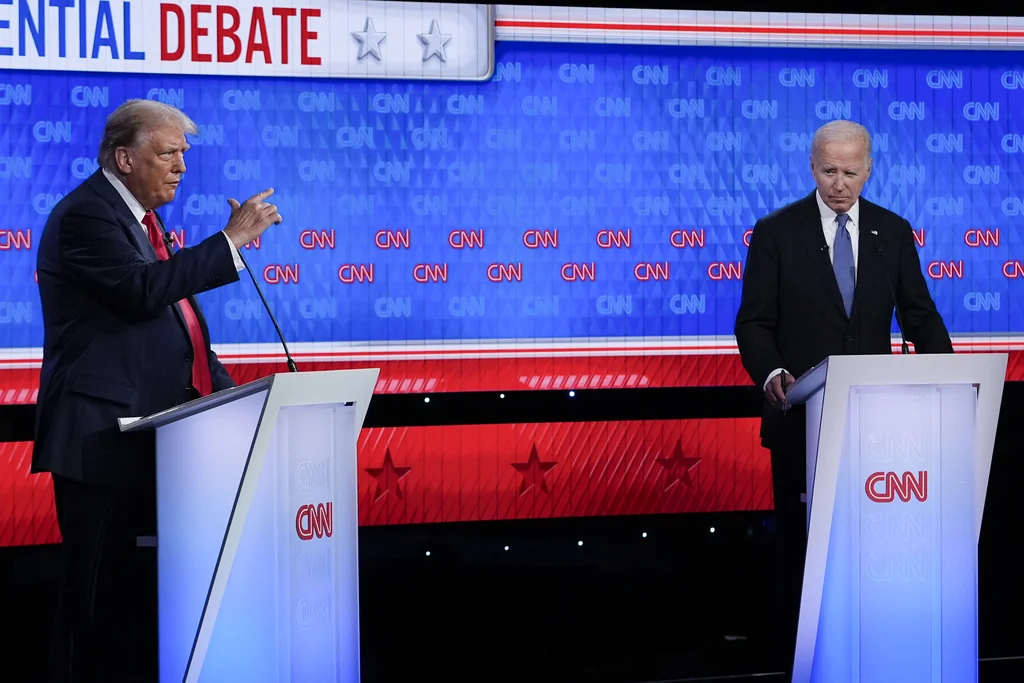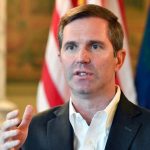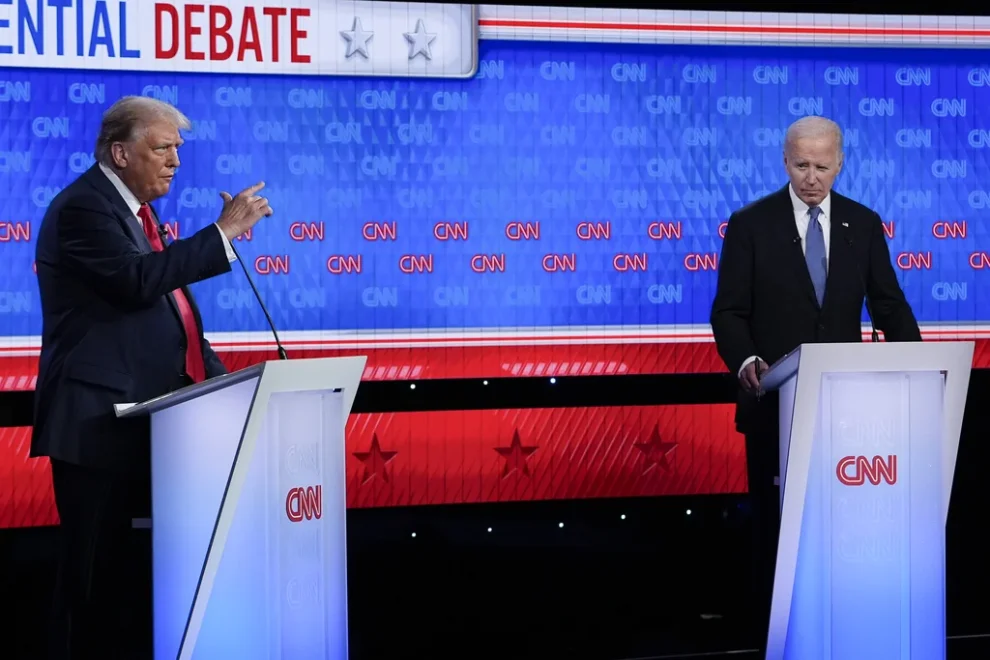Former President Joe Biden dropped out of the 2024 election on July 21, 2024, sending shockwaves through a race already upended by the attempted assassination of Donald Trump. Vice President Kamala Harris stepped in, only to be beaten by Trump. As Democrats try to recover, Biden, suffering from cancer, aims to protect what remains of his legacy. This Washington Examiner series, “Drop-out,” will look at what happened on that day, the aftermath for Biden, and how Harris’s future is up in the air. Part 1 looks at unanswered questions from drop-out day.
Former President Joe Biden’s decision to end his reelection bid with just 107 days left in the 2024 race will go down as one of the most consequential moments in modern political history.
But some details about what led up to it, as well as what immediately followed, remain unclear.
Discussions about whether the oldest president in United States history would seek a second term took place mostly behind closed doors between Biden and a small, insular circle of advisers in 2023. So too did conversations about whether, a year later, he should abandon that effort.
The party’s decision to anoint then-Vice President Kamala Harris as Biden’s successor was made in secret amid furious private maneuvering by former President Barack Obama, former House Speaker Nancy Pelosi, and other powerful Democratic leaders.
“We were living through history, and I think everyone sort of knew it at the time. Sometimes, things happen and you only really appreciate how stark it is in the aftermath,” Alex Conant, a Republican strategist and former top aide on then-Sen. Marco Rubio’s 2016 presidential campaign, told the Washington Examiner.
“We hadn’t really seen a president drop out like that in generations. And it’s coming right around the time of the assassination attempt on Trump, it was just a wild summer.”
One year later, questions about Biden’s shocking withdrawal from the race and Harris’s inability to escape his shadow remain unanswered.
Why did Biden’s team push for an early debate?
The push from Biden’s advisers to move the first presidential debate far up the calendar is in hindsight a disastrous decision that, it seems, regular sight should also have caught.
Biden had suffered a series of bruising headlines in the weeks before the June 27, 2024, debate because his cognitive decline was spilling into public view. His evident confusion at a D-Day commemoration in Normandy earlier that month, for example, raised eyebrows, as did a deeply reported story about his private struggles published in early June by the Wall Street Journal.
“There were these whispers about Biden’s acuity and a few stories in the media about it, and because a lot of his appearances had been kind of stage-managed, I guess the idea was that this would be an opportunity to put that all to rest,” David Hopkins, political science professor at Boston College, told the Washington Examiner. “Obviously, it worked out the other way around.”
Top Biden aides had argued in an April memo to the president that the campaign should push to move the scheduled debates with President Donald Trump from September to late June.
“[T]he earlier YOU are able to debate the better, so that the American people can see YOU standing next to Trump and showing the strength of YOUR leadership, compared to Trump’s weakness and chaos,” Biden’s advisers wrote in the memo to him.
That argument proved to be fatally flawed.
“The campaign knew that the election could not be a referendum on Biden. It had to be a choice. The best way to frame a choice for voters is a debate,” Conant said. “They wanted a debate because they thought Trump would be unhinged and remind people of why they didn’t like him in 2020, and given the same choice, they’d reelect Biden.”
“Clearly, the president’s political advisers thought he was more capable than he was,” he added.

What took Biden so long to drop out of the race?
The 24 days between Biden’s catastrophic debate performance and his withdrawal from the race featured a crescendo of Democratic anxiety, from deep concerns to full-blown panic, about the president’s electoral chances.
Why Biden took so long to exit remains unclear.
“After the debate, Biden attempted to rebound, including delivering an energetic rally speech and participating in an interview, arguing that his debate performance was a ‘bad night,’” Kelly Hyman, a Democratic political analyst, told the Washington Examiner.
Biden’s team indeed fought aggressively to forestall what came to feel like the inevitable.
He sat for an interview nine days after the debate with ABC’s George Stephanopoulos, which did little to demonstrate his vigor, particularly after Stephanopoulos was caught in a TMZ video telling a passerby on the street that after encountering the president, he didn’t believe Biden could serve four more years.
Six days later, he took questions at a press conference meant to showcase his ability to speak without a prompter, but his mix-up of Harris and “Vice President Trump” made headlines instead.
Still, 10 more days went by before Biden posted his decision to drop out on X.
Throughout the interlude between the debate and Biden’s withdrawal, the calls for him to step aside only grew louder.
But the president appeared determined, until the very end, to withstand the criticism.
“The presidency is really powerful, and it is very hard for people to speak truth to power,” Conant said. “People like Chuck Schumer, Nancy Pelosi, and Barack Obama were very reluctant to confront Biden.”
“And in the immediate aftermath of the debate, there was lots of hand-wringing, but also lots of rallying around Biden,” he added. “I think there was real concern that there was no alternative that could beat Trump.”
Behind the scenes, what was the tipping point that drove Biden out of the race?
The precise catalyst for Biden’s withdrawal on July 21, 2024, is unclear.
Roughly a week earlier, Sen. Chuck Schumer (D-NY) met with the president at the Biden family’s home in Rehoboth, Delaware. Schumer reportedly delivered a personal plea to Biden to step aside, relaying the fears of many congressional Democrats that his continued presence in the race would hand it to Trump.
Other reporting suggests it may have been his advisers’ presentation of polling data that showed Biden most pathways to the presidency had closed for him following the debate.
Those advisers had, for weeks since the debate, shielded him from how bad his numbers had gotten, according to Original Sin, a book by Jake Tapper and Alex Thompson based on more than 200 interviews with people in Biden’s orbit.
Although Jen O’Malley Dillon, co-chair of the Biden campaign, emailed Biden’s pollsters to schedule a meeting for them and Biden to discuss the latest data on July 8, the meeting was later canceled and never rescheduled, according to the book. Mike Donilon, one of Biden’s closest advisers, “was the only one who shared poll numbers with the president,” and some of his colleagues worried that the poll numbers were “first filtered through a Donilon spin machine that churned out the rosiest views,” the authors wrote.
But on July 20, just one day before Biden withdrew, Donilon and Steve Ricchetti, another top Biden aide, sat down with Biden at the Rehoboth house and talked him through some of the numbers. They said the polling was bad but, in their opinion, not insurmountable, and that while most congressional Democrats had abandoned him, some had not. Biden decided that evening he would drop out, the book said, although Donilon and Ricchetti told him to sleep on it.
Other campaign staffers were still booking fundraisers and mapping out Biden’s campaign schedule for the coming weeks at the time Biden withdrew, PBS reported.
The role Biden’s family played in his decision also remains unclear. Conflicting reports have muddled what Hunter Biden, the embattled former first son who was still in the midst of legal troubles at the time, wanted his father to do.
One book about the race, 2024: How Trump Retook the White House and the Democrats Lost America, by Josh Dawsey, Tyler Pager, and Isaac Arnsdorf, suggested Hunter Biden expressed a preference to see his father drop out following the debate.
“I sure would love to have my dad back,” Hunter Biden told his father after expressing support for whatever decision Joe Biden ultimately made, according to an excerpt. The book also noted that Hunter Biden frequently told people he had more interest than anyone in seeing his father withdraw from the race.
But another behind-the-scenes book about the race, Original Sin, characterized Hunter Biden’s position in a different light.
“Hunter privately talked about it as being the family against the world,” the book’s authors wrote.
Hunter Biden and Jill Biden were instead both urging Joe Biden to stay in the race in early July, according to the Associated Press, which reported that “[b]oth believe the president shouldn’t bow out when he’s down, and believe that he can come back from what they see as one subpar performance.”
“When you have a politician’s family, of course, sometimes they’re even more angry than the politicians themselves when there’s criticism,” Hopkins said. “The family likes having the president in the family. The first lady likes being first lady. The children like being the children of the president.”
What explains the 30-minute gap between Biden dropping out and endorsing Harris?
When Biden dropped out of the race on July 21, 2024, via a letter posted to his X account, speculation roared about who would replace him on the ticket.
It lasted all of 30 minutes.
The president followed his 1:46 pm post with another at 2:13 pm, throwing his support behind Harris.
“At the time I remember thinking it was pretty smart, because him not running again is such an earthquake that endorsing simultaneously, it would inevitably be lost,” Conant said.
“This way, everyone in America got two push notifications on their phone: one that Biden was dropping out, and one that he was endorsing Harris,” he added.
Some Democrats have wondered, particularly in retrospect, whether Biden’s near-immediate endorsement of Harris was a strategic blunder.
An open process, they said, may have yielded a candidate better equipped to take on Trump than someone so closely associated with the deeply unpopular incumbent president at the time. Even the semblance of an open process could have created the perception that Harris independently earned the nomination, rather than her stepping in as a continuation of the Biden era.
But Democratic leaders reportedly came to believe that a quick and seamless transition to Harris was the only workable option. With the convention looming in August, and the election just three months after that, they had simply run out of time to consider any other option.
Harris was ultimately unable to pivot away from Biden’s failures.
“As the sitting Vice President, Harris was linked to the Biden administration’s policies and achievements,” Hyman said. “Making a sharp break might have been perceived as disloyal and/or as undermining the very administration that she served.”
Questions about whether anyone other than Harris could legally access the millions of dollars Biden had raised up to that point also loomed over the Democratic succession process.
Why didn’t Obama endorse Harris quickly?
Voters and elected Democrats were nervously looking to Obama in the chaotic weeks after Biden’s debate disaster for cues as to how to proceed.
That made his five-day delay in endorsing Harris all the more noteworthy, given how big a role he, Pelosi, and a handful of others were said to be playing behind the scenes at the time.
“I’m not shocked with the way Obama played it,” Hopkins said. “Immediate action is not his style. He likes to think it over and get the lay of the land before he does something.”
Obama’s endorsement of Harris on July 26, 2024, helped cement her position as the unquestioned heir to Biden’s campaign and smothered whatever dissent may have been brewing about her swift elevation to the top of the ticket.
Conant said Obama’s delay may have been strategic.
“Nobody likes a coronation,” he said. “I think voters want candidates to earn nominations.”
Those five days may have been calculated to give voters the impression Obama wasn’t simply anointing Harris.
Still, the waiting period enraged some Democrats, who wanted the party to unify as quickly as possible after weeks of damaging infighting.
Whatever the reason for Obama’s hesitation, the timing ultimately didn’t seem to matter. Harris went on to lose all seven battleground states to Trump, and Democrats were finally fully unified on at least one point: Biden was the one to blame.
























